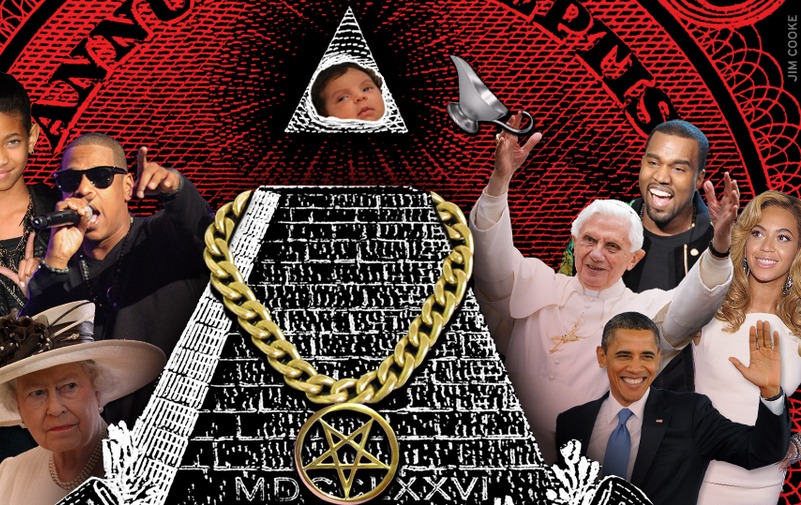(Source: PolicyMic)
Last April, Public Policy Polling surveyed the public about 20 well-known conspiracy theories. Not surprisingly, the results revealed a pattern of belief that broke down along partisan lines.
|
Desperate people use desperate measures. The looming credit default shows how little they believe they have to lose.
|
For example, while just 28 percent believe a global power elite is conspiring to impose a New World Order, 34 percent of Republicans and 35 percent of independents do—compared to just 15 percent of Democrats. Seventy-two percent of Democrats believe that the Bush administration deliberately lied about Iraqi weapons of mass destruction; 74 percent of Republicans disagree. Fifty-eight percent of Republicans believe global warming is a hoax; 77 percent of Democrats do not. Though the percentages are tiny, nearly twice as many Republicans (5 percent) than Democrats (2 percent) believe David Icke’s theory that hybrid alien/human lizards rule the world.
Part 2 of PPP’s survey was released on Oct. 2. When it comes to conspiracy theories, Republicans continue to display more credulity. sixty-two percent of Republicans and 38 percent of independents believe the Obama administration is “secretly trying to take everyone’s guns away” compared to only 14 percent of Democrats. Forty-two percent of Republicans believe Shariah law is making its way into U.S. courts while only 12 percent of Democrats do. More than twice as many Republican voters (21 percent) as Democrats (9 percent) believe the government is using “false flag incidents” to consolidate its power.
Forty-four percent of Republicans and 21 percent of independents believe Obama is secretly plotting to stay in office after his second term. Eleven percent of Democrats agree.
As to whether you believe that “a group of world bankers is slowly eliminating paper currency until most banking is done electronically, and then will cut the power grid so that most citizens will not have access to any money and will be forced into worldwide slavery,” 27 percent of Republicans answered “yes” (as compared to just 17 percent of the public at large, 10 percent of Democrats, and 14 percent of independents).
Unfortunately, PPP did not ask respondents whether they believe that the “debt ceiling is a hoax”—an idea which appears to have captured a significant slice of Republican lawmakers over the last few weeks, including Senator Tom Coburn of Oklahoma (“I would dispel the rumor that is going around that you hear on every newscast that if we don’t raise the debt ceiling we will default on our debt. We won’t.”).
As someone who has written extensively about conspiracy theories in general and conspiracy theories and the right more specifically, I would argue that the significance of the PPP surveys goes well beyond the snarky, “look how nuts they are!” headlines they generate.
For one thing, they show that the boundary between the “right” and the “far right” that the likes of William F. Buckley and Russell Kirk policed so carefully in the early 1960s, when they pressured Barry Goldwater to disassociate himself from Robert Welch and the John Birch Society, is not as clearly demarcated as it was.
How could it be when leading Republicans have taken so many of the issues that were once the sole province of the far right to heart? Look at, to name just one example, Ted Cruz’s demagoguery about Agenda 21, the UN’s non-binding plan to encourage sustainable development, as a “globalist plan that tries to subvert the U.S. Constitution and the liberties we all cherish as Americans.”
Though the GOP remains the “party of business” in its policies, its outreach to economic populists and neo-secessionist states rightists has created a coalition that includes groups that are openly hostile to Wall Street and other economic elites, that see the Federal Reserve, for example, as a critical node of the Jewish conspiracy. This is an idea that goes all the way back to the Fed’s founding in 1913; it was trumpeted by conspiracy theorists like Henry Ford in the 1920s and the Republican Congressman Louis McFadden in the 1930s; it even played a role in Richard M. Nixon’s thinking, though he was more of a classic paranoid than a conspiracy theorist.
The GOP’s alliance with the Christian right has brought premillennial dispensationalists into its fold—people who believe that the world is not only coming to an end, but that the sooner civil order breaks down, the sooner Jesus will return. Dominionists like Ted Cruz’s father, who believe that the U.S. government should be run on a biblical basis, are increasingly prominent in the GOP. As believers in the “substance of things hoped for, the evidence of things not seen” (Hebrews 11), it’s not surprising that fundamentalists would be especially susceptible to conspiracy theories.
Conspiracy theories like the ones the PPP asked about are the last refuge of the powerless. At their heart is the Gnostic belief that the world has been turned upside down—that God is a Satanic impostor, the police are a mob, the courts are run by criminals. In the anxious Republican imagination, innocent whites are being victimized by vengeful minorities; the rich are being reduced to beggary by the poor. That so many Republicans believe that the Obama Imperium is conspiring to throw them to the lions testifies to their mounting sense of desperation.
Unfortunately, desperate people use desperate measures.
The looming U.S. credit default shows how little they believe they have to lose.
In my book The New Hate, I made the point that while most politicians use conspiratorial memes opportunistically, they can be quite sticky—once a politician incorporates one of them into his or her “brand,” it can be very hard to shake off later on. They don’t even seem that crazy after a while; epistemic closure normalizes them. For those inside the Fox News bubble, “the unbelieveable,” in Richard Hofstadter’s words, becomes “the only thing that can be believed.”
As I suspect has happened with the debt ceiling crisis, the radical tail ends up wagging the mainstream dog. And everybody suffers.
Arthur Goldwag is the author of Isms & Ologies; Cults, Conspiracies, and Secret Societies, and most recently The New Hate: A History of Fear and Loathing on the Populist Right. He lives in Brooklyn with his wife and two children. Follow him at @ArthurGoldwag.





0 Comments